Ethical Analysis of Facebook Corporation Practices: ICT Ethical Issue
VerifiedAdded on 2023/01/18
|9
|1629
|35
Report
AI Summary
This report, titled "ICT Ethical Issue," presents an analysis of ethical issues surrounding the Facebook Corporation. The student analyzes a campaign against Facebook's unethical practices, using argument visualization and applying four classical ethical theories: utilitarianism, deontology, contract theory, and virtue analysis. The report discusses the impact of Facebook's privacy and security issues, especially in the context of the 2011 consent order and the Cambridge Analytica scandal. The analysis evaluates Facebook's practices through the lens of each ethical theory, examining the implications for users, businesses, and overall societal impact. The report concludes by highlighting the benefits of the campaign and the importance of addressing security and privacy concerns within Facebook's operations.
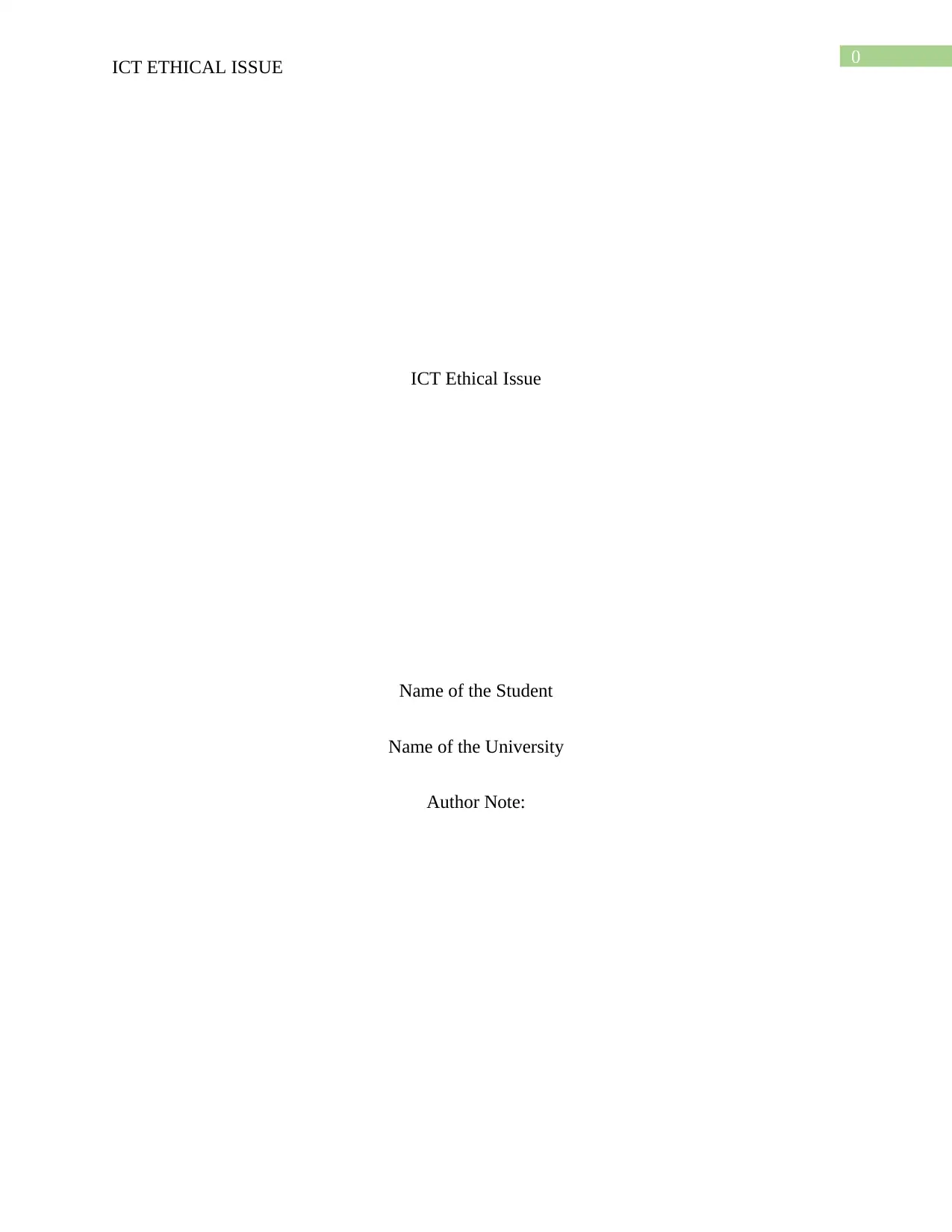
0
ICT ETHICAL ISSUE
ICT Ethical Issue
Name of the Student
Name of the University
Author Note:
ICT ETHICAL ISSUE
ICT Ethical Issue
Name of the Student
Name of the University
Author Note:
Paraphrase This Document
Need a fresh take? Get an instant paraphrase of this document with our AI Paraphraser
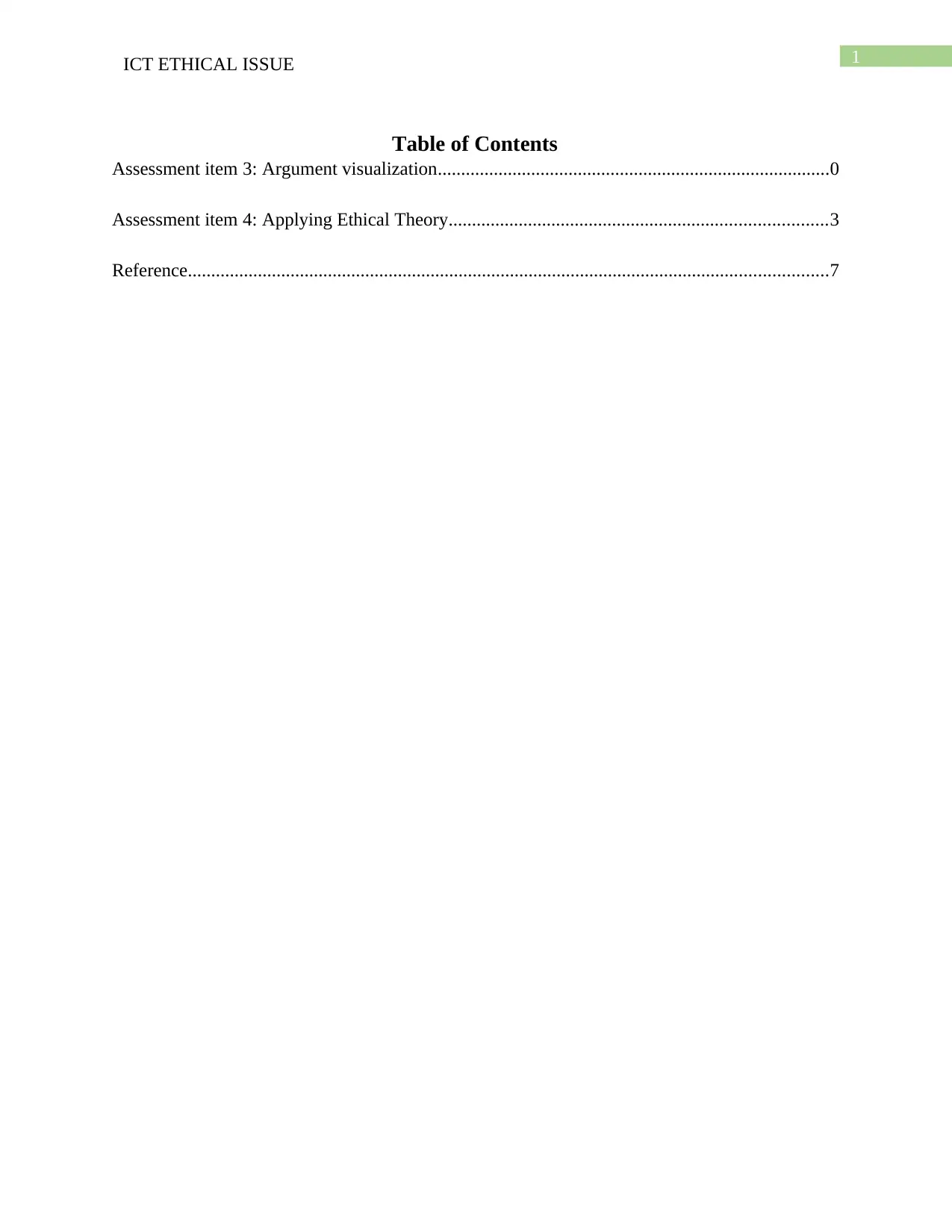
1ICT ETHICAL ISSUE
Table of Contents
Assessment item 3: Argument visualization....................................................................................0
Assessment item 4: Applying Ethical Theory.................................................................................3
Reference.........................................................................................................................................7
Table of Contents
Assessment item 3: Argument visualization....................................................................................0
Assessment item 4: Applying Ethical Theory.................................................................................3
Reference.........................................................................................................................................7
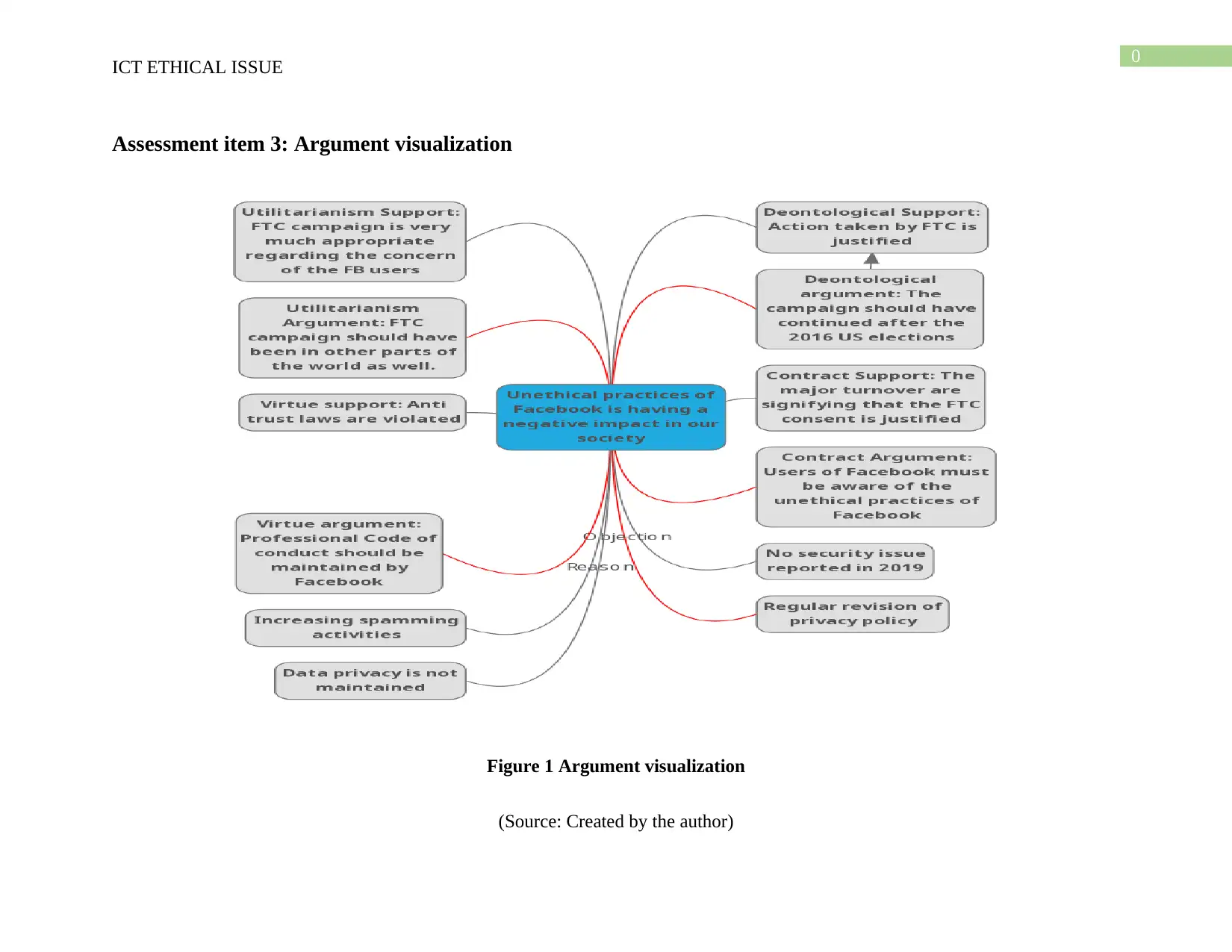
0
ICT ETHICAL ISSUE
Assessment item 3: Argument visualization
Figure 1 Argument visualization
(Source: Created by the author)
ICT ETHICAL ISSUE
Assessment item 3: Argument visualization
Figure 1 Argument visualization
(Source: Created by the author)
⊘ This is a preview!⊘
Do you want full access?
Subscribe today to unlock all pages.

Trusted by 1+ million students worldwide
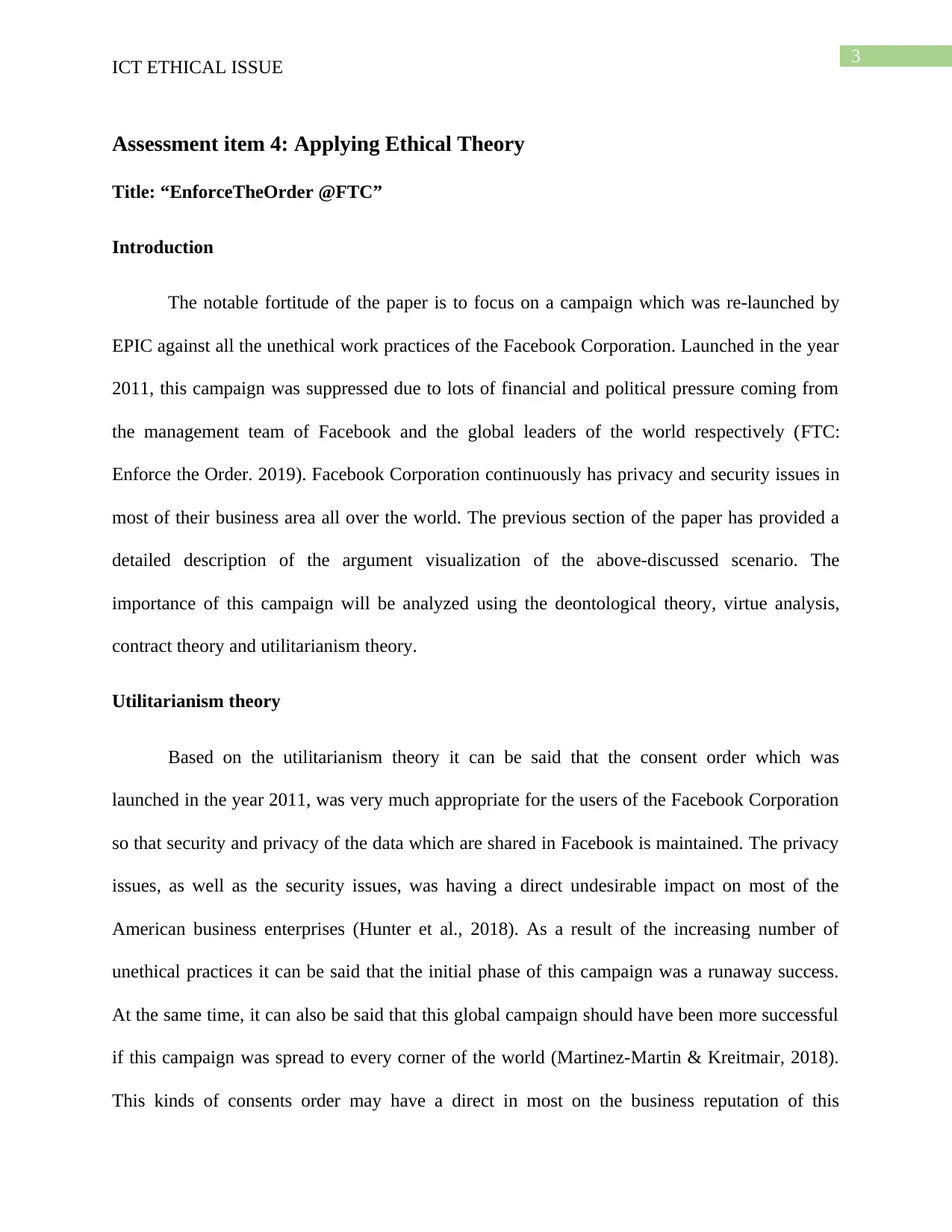
3
ICT ETHICAL ISSUE
Assessment item 4: Applying Ethical Theory
Title: “EnforceTheOrder @FTC”
Introduction
The notable fortitude of the paper is to focus on a campaign which was re-launched by
EPIC against all the unethical work practices of the Facebook Corporation. Launched in the year
2011, this campaign was suppressed due to lots of financial and political pressure coming from
the management team of Facebook and the global leaders of the world respectively (FTC:
Enforce the Order. 2019). Facebook Corporation continuously has privacy and security issues in
most of their business area all over the world. The previous section of the paper has provided a
detailed description of the argument visualization of the above-discussed scenario. The
importance of this campaign will be analyzed using the deontological theory, virtue analysis,
contract theory and utilitarianism theory.
Utilitarianism theory
Based on the utilitarianism theory it can be said that the consent order which was
launched in the year 2011, was very much appropriate for the users of the Facebook Corporation
so that security and privacy of the data which are shared in Facebook is maintained. The privacy
issues, as well as the security issues, was having a direct undesirable impact on most of the
American business enterprises (Hunter et al., 2018). As a result of the increasing number of
unethical practices it can be said that the initial phase of this campaign was a runaway success.
At the same time, it can also be said that this global campaign should have been more successful
if this campaign was spread to every corner of the world (Martinez-Martin & Kreitmair, 2018).
This kinds of consents order may have a direct in most on the business reputation of this
ICT ETHICAL ISSUE
Assessment item 4: Applying Ethical Theory
Title: “EnforceTheOrder @FTC”
Introduction
The notable fortitude of the paper is to focus on a campaign which was re-launched by
EPIC against all the unethical work practices of the Facebook Corporation. Launched in the year
2011, this campaign was suppressed due to lots of financial and political pressure coming from
the management team of Facebook and the global leaders of the world respectively (FTC:
Enforce the Order. 2019). Facebook Corporation continuously has privacy and security issues in
most of their business area all over the world. The previous section of the paper has provided a
detailed description of the argument visualization of the above-discussed scenario. The
importance of this campaign will be analyzed using the deontological theory, virtue analysis,
contract theory and utilitarianism theory.
Utilitarianism theory
Based on the utilitarianism theory it can be said that the consent order which was
launched in the year 2011, was very much appropriate for the users of the Facebook Corporation
so that security and privacy of the data which are shared in Facebook is maintained. The privacy
issues, as well as the security issues, was having a direct undesirable impact on most of the
American business enterprises (Hunter et al., 2018). As a result of the increasing number of
unethical practices it can be said that the initial phase of this campaign was a runaway success.
At the same time, it can also be said that this global campaign should have been more successful
if this campaign was spread to every corner of the world (Martinez-Martin & Kreitmair, 2018).
This kinds of consents order may have a direct in most on the business reputation of this
Paraphrase This Document
Need a fresh take? Get an instant paraphrase of this document with our AI Paraphraser
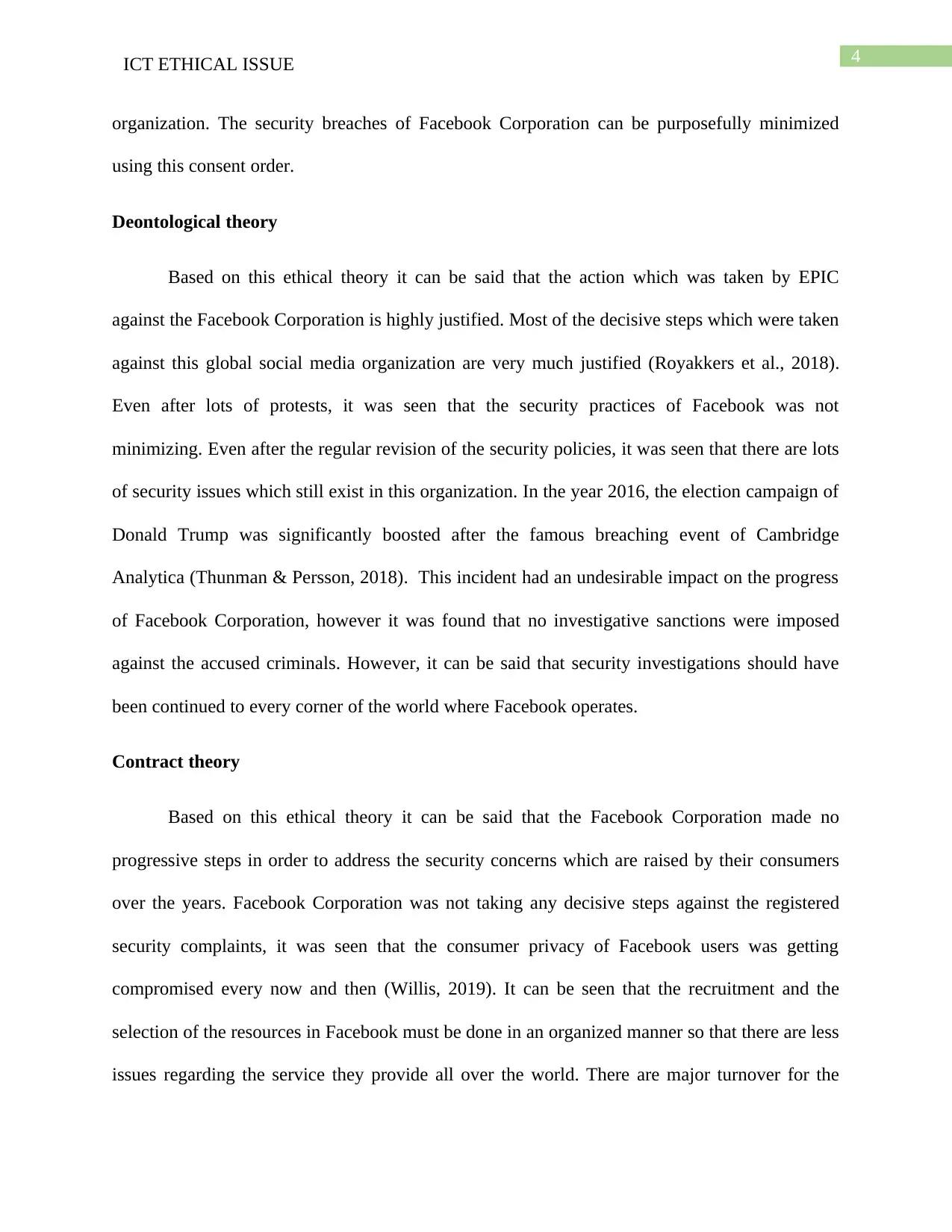
4ICT ETHICAL ISSUE
organization. The security breaches of Facebook Corporation can be purposefully minimized
using this consent order.
Deontological theory
Based on this ethical theory it can be said that the action which was taken by EPIC
against the Facebook Corporation is highly justified. Most of the decisive steps which were taken
against this global social media organization are very much justified (Royakkers et al., 2018).
Even after lots of protests, it was seen that the security practices of Facebook was not
minimizing. Even after the regular revision of the security policies, it was seen that there are lots
of security issues which still exist in this organization. In the year 2016, the election campaign of
Donald Trump was significantly boosted after the famous breaching event of Cambridge
Analytica (Thunman & Persson, 2018). This incident had an undesirable impact on the progress
of Facebook Corporation, however it was found that no investigative sanctions were imposed
against the accused criminals. However, it can be said that security investigations should have
been continued to every corner of the world where Facebook operates.
Contract theory
Based on this ethical theory it can be said that the Facebook Corporation made no
progressive steps in order to address the security concerns which are raised by their consumers
over the years. Facebook Corporation was not taking any decisive steps against the registered
security complaints, it was seen that the consumer privacy of Facebook users was getting
compromised every now and then (Willis, 2019). It can be seen that the recruitment and the
selection of the resources in Facebook must be done in an organized manner so that there are less
issues regarding the service they provide all over the world. There are major turnover for the
organization. The security breaches of Facebook Corporation can be purposefully minimized
using this consent order.
Deontological theory
Based on this ethical theory it can be said that the action which was taken by EPIC
against the Facebook Corporation is highly justified. Most of the decisive steps which were taken
against this global social media organization are very much justified (Royakkers et al., 2018).
Even after lots of protests, it was seen that the security practices of Facebook was not
minimizing. Even after the regular revision of the security policies, it was seen that there are lots
of security issues which still exist in this organization. In the year 2016, the election campaign of
Donald Trump was significantly boosted after the famous breaching event of Cambridge
Analytica (Thunman & Persson, 2018). This incident had an undesirable impact on the progress
of Facebook Corporation, however it was found that no investigative sanctions were imposed
against the accused criminals. However, it can be said that security investigations should have
been continued to every corner of the world where Facebook operates.
Contract theory
Based on this ethical theory it can be said that the Facebook Corporation made no
progressive steps in order to address the security concerns which are raised by their consumers
over the years. Facebook Corporation was not taking any decisive steps against the registered
security complaints, it was seen that the consumer privacy of Facebook users was getting
compromised every now and then (Willis, 2019). It can be seen that the recruitment and the
selection of the resources in Facebook must be done in an organized manner so that there are less
issues regarding the service they provide all over the world. There are major turnover for the
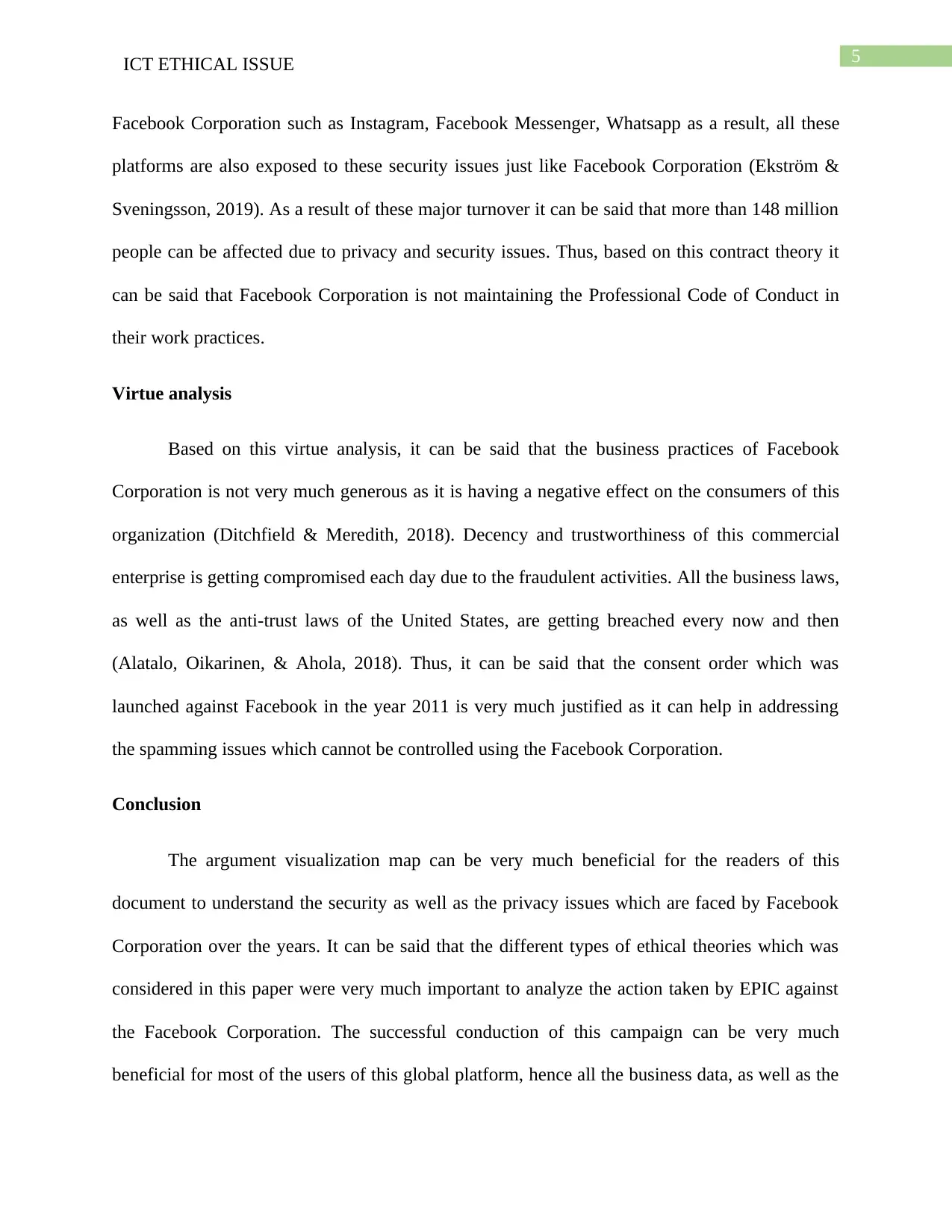
5ICT ETHICAL ISSUE
Facebook Corporation such as Instagram, Facebook Messenger, Whatsapp as a result, all these
platforms are also exposed to these security issues just like Facebook Corporation (Ekström &
Sveningsson, 2019). As a result of these major turnover it can be said that more than 148 million
people can be affected due to privacy and security issues. Thus, based on this contract theory it
can be said that Facebook Corporation is not maintaining the Professional Code of Conduct in
their work practices.
Virtue analysis
Based on this virtue analysis, it can be said that the business practices of Facebook
Corporation is not very much generous as it is having a negative effect on the consumers of this
organization (Ditchfield & Meredith, 2018). Decency and trustworthiness of this commercial
enterprise is getting compromised each day due to the fraudulent activities. All the business laws,
as well as the anti-trust laws of the United States, are getting breached every now and then
(Alatalo, Oikarinen, & Ahola, 2018). Thus, it can be said that the consent order which was
launched against Facebook in the year 2011 is very much justified as it can help in addressing
the spamming issues which cannot be controlled using the Facebook Corporation.
Conclusion
The argument visualization map can be very much beneficial for the readers of this
document to understand the security as well as the privacy issues which are faced by Facebook
Corporation over the years. It can be said that the different types of ethical theories which was
considered in this paper were very much important to analyze the action taken by EPIC against
the Facebook Corporation. The successful conduction of this campaign can be very much
beneficial for most of the users of this global platform, hence all the business data, as well as the
Facebook Corporation such as Instagram, Facebook Messenger, Whatsapp as a result, all these
platforms are also exposed to these security issues just like Facebook Corporation (Ekström &
Sveningsson, 2019). As a result of these major turnover it can be said that more than 148 million
people can be affected due to privacy and security issues. Thus, based on this contract theory it
can be said that Facebook Corporation is not maintaining the Professional Code of Conduct in
their work practices.
Virtue analysis
Based on this virtue analysis, it can be said that the business practices of Facebook
Corporation is not very much generous as it is having a negative effect on the consumers of this
organization (Ditchfield & Meredith, 2018). Decency and trustworthiness of this commercial
enterprise is getting compromised each day due to the fraudulent activities. All the business laws,
as well as the anti-trust laws of the United States, are getting breached every now and then
(Alatalo, Oikarinen, & Ahola, 2018). Thus, it can be said that the consent order which was
launched against Facebook in the year 2011 is very much justified as it can help in addressing
the spamming issues which cannot be controlled using the Facebook Corporation.
Conclusion
The argument visualization map can be very much beneficial for the readers of this
document to understand the security as well as the privacy issues which are faced by Facebook
Corporation over the years. It can be said that the different types of ethical theories which was
considered in this paper were very much important to analyze the action taken by EPIC against
the Facebook Corporation. The successful conduction of this campaign can be very much
beneficial for most of the users of this global platform, hence all the business data, as well as the
⊘ This is a preview!⊘
Do you want full access?
Subscribe today to unlock all pages.

Trusted by 1+ million students worldwide
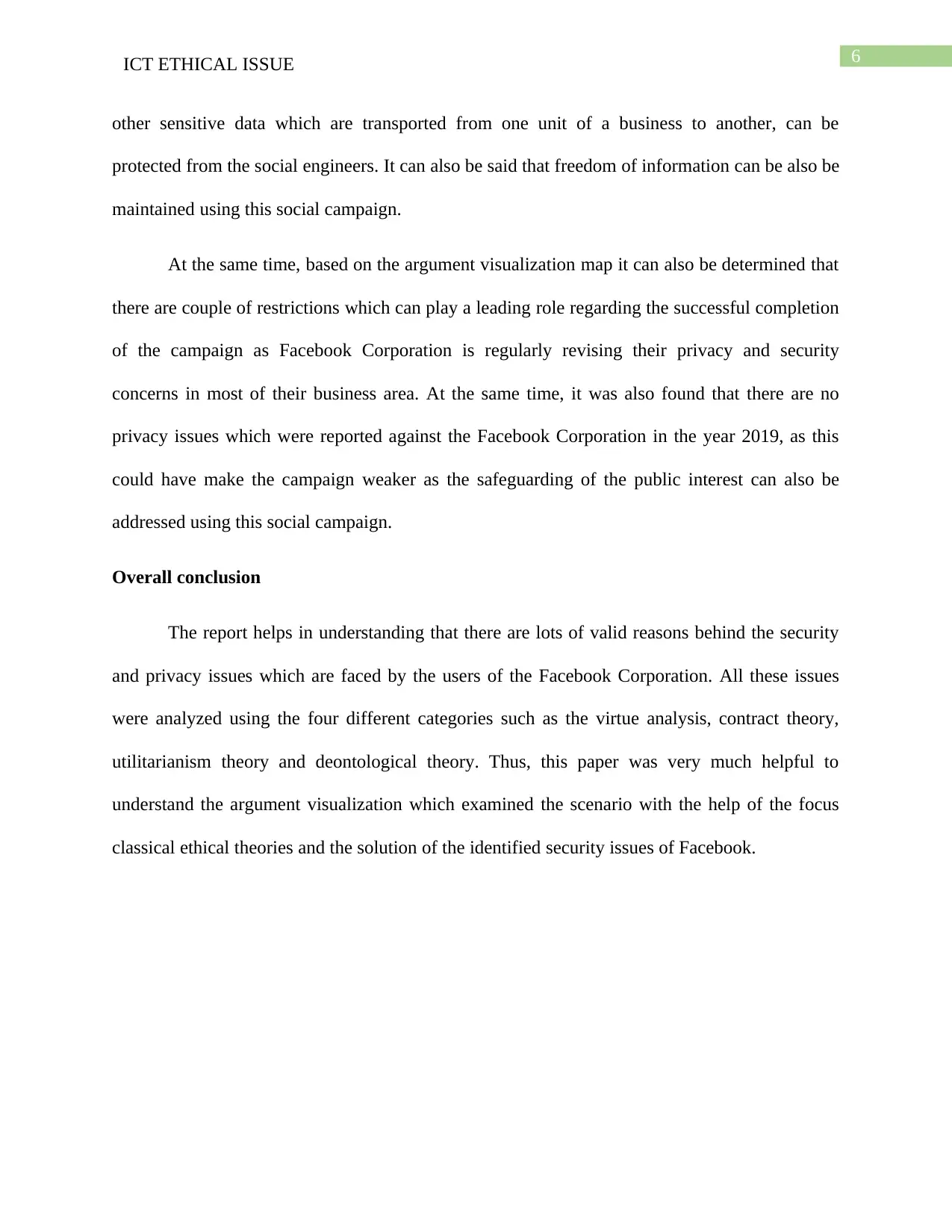
6ICT ETHICAL ISSUE
other sensitive data which are transported from one unit of a business to another, can be
protected from the social engineers. It can also be said that freedom of information can be also be
maintained using this social campaign.
At the same time, based on the argument visualization map it can also be determined that
there are couple of restrictions which can play a leading role regarding the successful completion
of the campaign as Facebook Corporation is regularly revising their privacy and security
concerns in most of their business area. At the same time, it was also found that there are no
privacy issues which were reported against the Facebook Corporation in the year 2019, as this
could have make the campaign weaker as the safeguarding of the public interest can also be
addressed using this social campaign.
Overall conclusion
The report helps in understanding that there are lots of valid reasons behind the security
and privacy issues which are faced by the users of the Facebook Corporation. All these issues
were analyzed using the four different categories such as the virtue analysis, contract theory,
utilitarianism theory and deontological theory. Thus, this paper was very much helpful to
understand the argument visualization which examined the scenario with the help of the focus
classical ethical theories and the solution of the identified security issues of Facebook.
other sensitive data which are transported from one unit of a business to another, can be
protected from the social engineers. It can also be said that freedom of information can be also be
maintained using this social campaign.
At the same time, based on the argument visualization map it can also be determined that
there are couple of restrictions which can play a leading role regarding the successful completion
of the campaign as Facebook Corporation is regularly revising their privacy and security
concerns in most of their business area. At the same time, it was also found that there are no
privacy issues which were reported against the Facebook Corporation in the year 2019, as this
could have make the campaign weaker as the safeguarding of the public interest can also be
addressed using this social campaign.
Overall conclusion
The report helps in understanding that there are lots of valid reasons behind the security
and privacy issues which are faced by the users of the Facebook Corporation. All these issues
were analyzed using the four different categories such as the virtue analysis, contract theory,
utilitarianism theory and deontological theory. Thus, this paper was very much helpful to
understand the argument visualization which examined the scenario with the help of the focus
classical ethical theories and the solution of the identified security issues of Facebook.
Paraphrase This Document
Need a fresh take? Get an instant paraphrase of this document with our AI Paraphraser
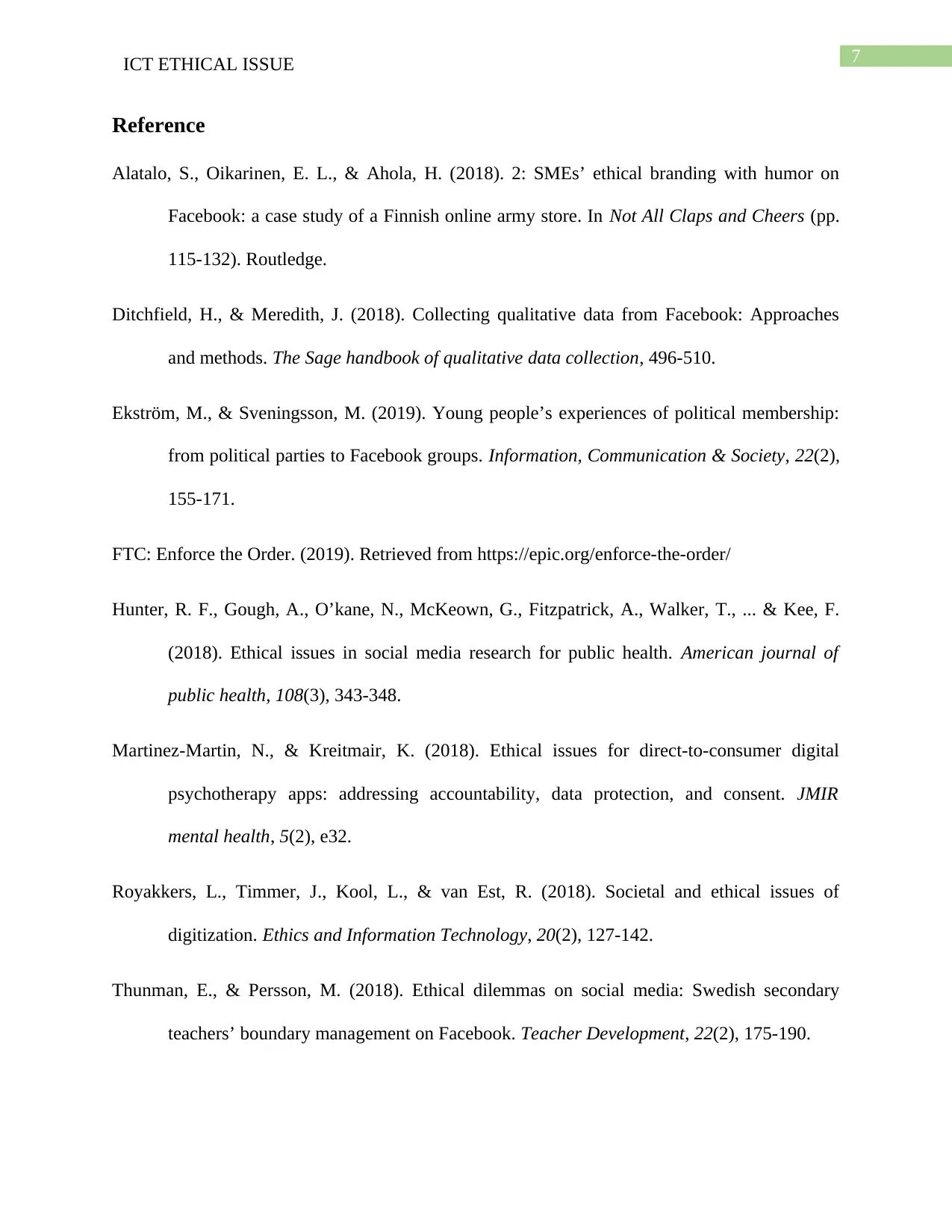
7ICT ETHICAL ISSUE
Reference
Alatalo, S., Oikarinen, E. L., & Ahola, H. (2018). 2: SMEs’ ethical branding with humor on
Facebook: a case study of a Finnish online army store. In Not All Claps and Cheers (pp.
115-132). Routledge.
Ditchfield, H., & Meredith, J. (2018). Collecting qualitative data from Facebook: Approaches
and methods. The Sage handbook of qualitative data collection, 496-510.
Ekström, M., & Sveningsson, M. (2019). Young people’s experiences of political membership:
from political parties to Facebook groups. Information, Communication & Society, 22(2),
155-171.
FTC: Enforce the Order. (2019). Retrieved from https://epic.org/enforce-the-order/
Hunter, R. F., Gough, A., O’kane, N., McKeown, G., Fitzpatrick, A., Walker, T., ... & Kee, F.
(2018). Ethical issues in social media research for public health. American journal of
public health, 108(3), 343-348.
Martinez-Martin, N., & Kreitmair, K. (2018). Ethical issues for direct-to-consumer digital
psychotherapy apps: addressing accountability, data protection, and consent. JMIR
mental health, 5(2), e32.
Royakkers, L., Timmer, J., Kool, L., & van Est, R. (2018). Societal and ethical issues of
digitization. Ethics and Information Technology, 20(2), 127-142.
Thunman, E., & Persson, M. (2018). Ethical dilemmas on social media: Swedish secondary
teachers’ boundary management on Facebook. Teacher Development, 22(2), 175-190.
Reference
Alatalo, S., Oikarinen, E. L., & Ahola, H. (2018). 2: SMEs’ ethical branding with humor on
Facebook: a case study of a Finnish online army store. In Not All Claps and Cheers (pp.
115-132). Routledge.
Ditchfield, H., & Meredith, J. (2018). Collecting qualitative data from Facebook: Approaches
and methods. The Sage handbook of qualitative data collection, 496-510.
Ekström, M., & Sveningsson, M. (2019). Young people’s experiences of political membership:
from political parties to Facebook groups. Information, Communication & Society, 22(2),
155-171.
FTC: Enforce the Order. (2019). Retrieved from https://epic.org/enforce-the-order/
Hunter, R. F., Gough, A., O’kane, N., McKeown, G., Fitzpatrick, A., Walker, T., ... & Kee, F.
(2018). Ethical issues in social media research for public health. American journal of
public health, 108(3), 343-348.
Martinez-Martin, N., & Kreitmair, K. (2018). Ethical issues for direct-to-consumer digital
psychotherapy apps: addressing accountability, data protection, and consent. JMIR
mental health, 5(2), e32.
Royakkers, L., Timmer, J., Kool, L., & van Est, R. (2018). Societal and ethical issues of
digitization. Ethics and Information Technology, 20(2), 127-142.
Thunman, E., & Persson, M. (2018). Ethical dilemmas on social media: Swedish secondary
teachers’ boundary management on Facebook. Teacher Development, 22(2), 175-190.
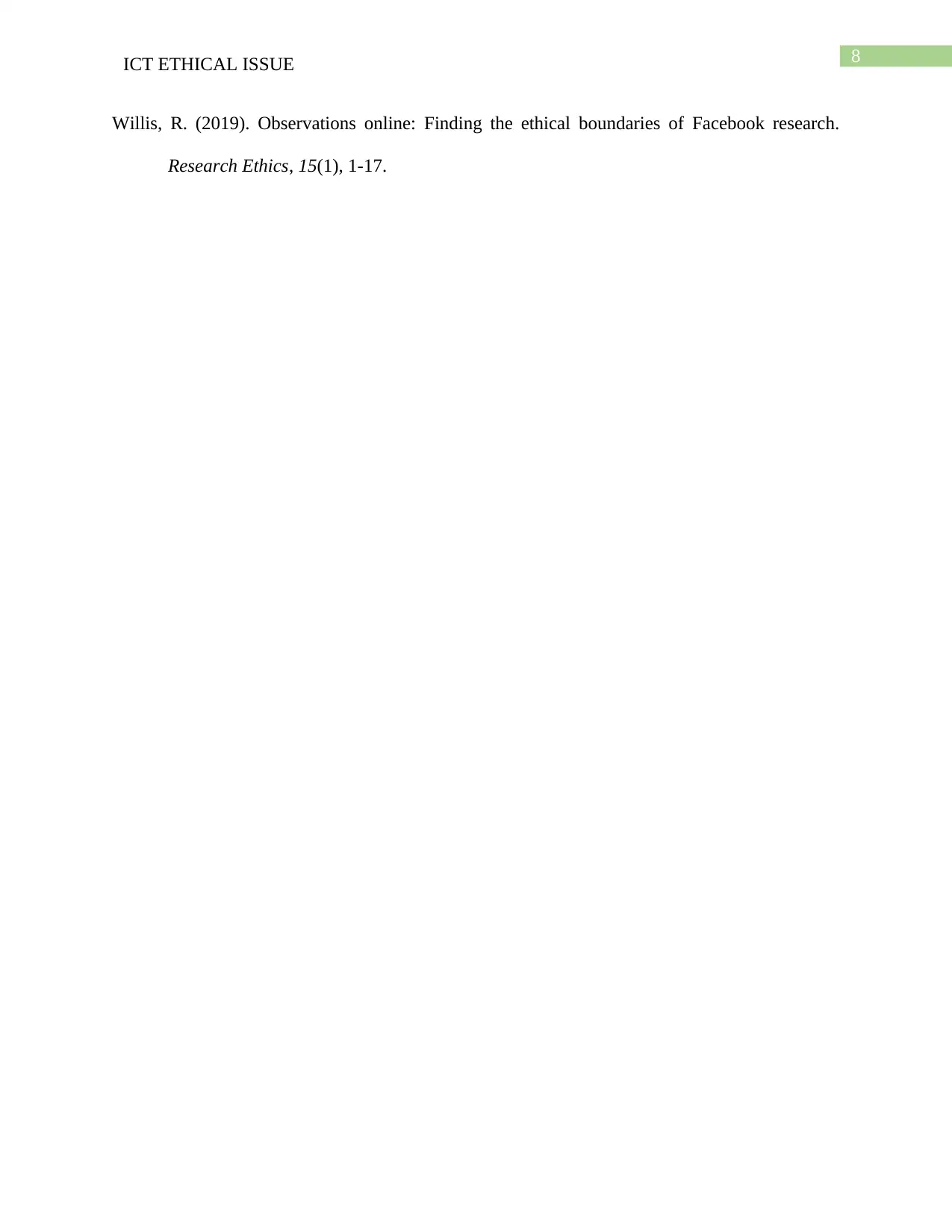
8ICT ETHICAL ISSUE
Willis, R. (2019). Observations online: Finding the ethical boundaries of Facebook research.
Research Ethics, 15(1), 1-17.
Willis, R. (2019). Observations online: Finding the ethical boundaries of Facebook research.
Research Ethics, 15(1), 1-17.
⊘ This is a preview!⊘
Do you want full access?
Subscribe today to unlock all pages.

Trusted by 1+ million students worldwide
1 out of 9
Related Documents
Your All-in-One AI-Powered Toolkit for Academic Success.
+13062052269
info@desklib.com
Available 24*7 on WhatsApp / Email
![[object Object]](/_next/static/media/star-bottom.7253800d.svg)
Unlock your academic potential
Copyright © 2020–2026 A2Z Services. All Rights Reserved. Developed and managed by ZUCOL.





